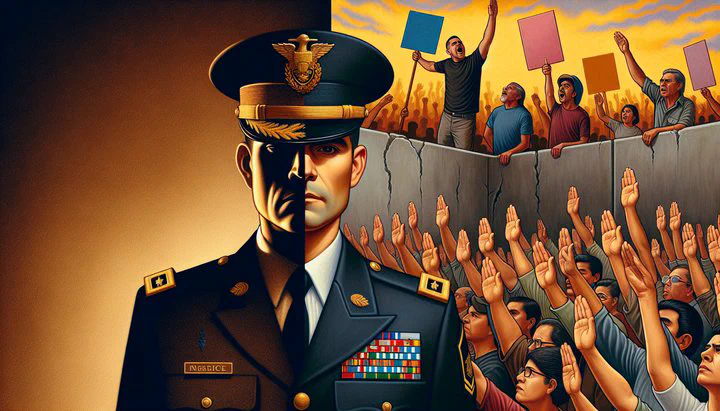Chun Doo-hwan Gwangju Uprising Success

Chun Doo-hwan: Military Leadership and Controversy in the Gwangju Uprising
Chun Doo-hwan is a figure of intense debate in South Korea’s history. As a military leader, his actions during the Gwangju Uprising in May 1980 are seen by some as a strategic success, while others view them as a harsh crackdown. This article explores his military background, leadership during the uprising, and the lasting controversy surrounding his legacy, aiming to provide a comprehensive understanding of this complex historical figure.
Chun Doo-hwan: The Elite Soldier
Chun Doo-hwan’s journey in the military began with a focus on excellence. From an early stage in his career, Chun was considered an elite soldier, renowned for his dedication and skill. He trained hard, learning complex military strategies and tactics that set him apart. Chun’s ability to lead and his tactical smarts were noticed by his superiors, helping him rise quickly through the ranks.
His strong reputation within the military was not just about his skills on the battlefield. Chun was known for his strategic thinking and ability to inspire those around him. Fellow soldiers often spoke of his charisma and the confidence he exuded, which earned him respect and loyalty. This foundation of trust would later play a crucial role in his leadership during pivotal moments in his career.
Chun’s achievements and leadership style made a lasting impression on those who served with him. Stories from veterans highlight how Chun Doo-hwan had served in the very division I was in, showcasing the deep connection and influence he had on his fellow soldiers. These experiences not only shaped his path but also set the stage for his role in the Gwangju Uprising, where his actions would be viewed through the lens of his military expertise.
Leadership During the Gwangju Uprising
The Gwangju Uprising was a critical moment in South Korea’s history, and Chun Doo-hwan’s leadership during this time has been much debated. In May 1980, tensions were high as citizens in Gwangju protested against the military government. Chun, using his military background, took steps to control the situation. His actions were seen by some as a show of strategic skill, while others thought they were too harsh.
During the uprising, Chun enforced a strict military response. He organized troops to suppress the protests, believing this was needed to restore order. For many in the military, his success during the Gwangju Uprising was due to his quick, strategic decisions under pressure. Some peers praised his actions, seeing them as proof of his strong leadership and tactical expertise.
However, Chun’s approach was controversial. While some respected his strategies, others criticized the methods used to stop the protests. The heavy response led to civilian casualties, causing outrage at home and abroad. Despite this, some military personnel still admired Chun’s resolve, with one officer noting, “Chun Doo-hwan had served in the very division I was in, and his decisiveness was unmatched.”
The Gwangju Uprising remains a complex chapter in Chun’s legacy. His military leadership during the crisis is often viewed through contrasting lenses—seen as either a necessary move to maintain stability or a brutal crackdown on democratic hopes. This duality continues to fuel discussions about Chun Doo-hwan Gwangju Uprising success and the impact of his military decisions on South Korea’s history.
Legacy and Controversy
Chun Doo-hwan’s legacy is marked by both admiration and criticism, mainly because of his actions during the Gwangju Uprising. For some, his success during the Gwangju Uprising showed his ability to lead firmly during a national crisis. His supporters often highlight how his military skills helped him navigate the challenges of leadership, maintaining stability in South Korea during tough times.
However, Chun’s legacy is also deeply controversial. Many view his response to the Gwangju Uprising as too aggressive, leading to unnecessary loss of life and suffering. This heavy-handed approach has led to widespread condemnation. Critics argue that his actions during the uprising overshadow any positive impacts he may have had, questioning whether Chun Doo-hwan Gwangju Uprising success was truly justified.
The mixed reception of Chun’s legacy is also seen among those who served with him. While some former colleagues remember his strong reputation within the military and his decisive leadership, others express regret over the methods used during the uprising. One soldier shared, “Although Chun Doo-hwan had served in the very division I was in, the events at Gwangju left me questioning the cost of our actions.”
Chun’s military background shaped his approach to governance and crisis management. His strategic mindset and elite training informed his decisions. As time goes on, the debate over his legacy continues, with South Koreans reflecting on the balance between maintaining order and respecting democratic freedoms. This ongoing discussion ensures that Chun Doo-hwan Gwangju Uprising success remains a complex and contested topic in history.
As you reflect on Chun Doo-hwan’s story, consider how military leadership can balance order with democratic values. What lessons can be learned from this chapter in history? Feel free to share your thoughts and join the discussion.